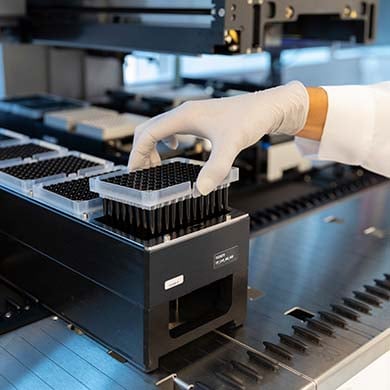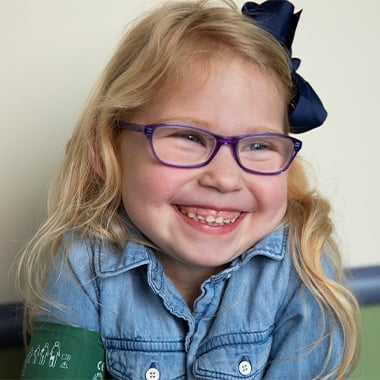Tomi Pastinen, MD, PhD
Dee Lyons/Missouri Endowed Chair in Pediatric Genomic Medicine, Pediatrics/Genomic Medicine Center (GMC); Director, Center for Pediatric Genomic Medicine; Professor of Pediatrics, University of Missouri-Kansas City School of Medicine; Research Professor of Cancer Biology, University of Kansas School of Medicine
Full BiographyCarol Saunders, PhD, FACMG
Division Director, Clinical & Laboratory Genetics & Genomics; Professor of Pathology, University of Missouri-Kansas City School of Medicine; Clinical Assistant Professor of Pathology, University of Kansas School of Medicine
Full Biography
Children’s Mercy Kansas City, one of the nation’s leading independent pediatric health organizations, announced it is the first health care system to use 5-base HiFi sequencing, the world’s most-advanced genomic sequencing technology from PacBio, in the clinical setting to accelerate diagnoses for even more patients and families.
The cutting-edge technology replaces rapid exome, chromosomal microarray analysis and other conventional diagnostic testing as a first line expediated assessment for the most-critically ill patients in the hospital with a strong suspicion of genetic disease.
“The evidence we have generated supports the clinical adoption of 5-base HiFi sequencing and we have demonstrated the utility over other conventional testing modalities,” said Tomi Pastinen, MD, PhD., Director, Genomic Medicine Center, Children’s Mercy. “We have been able to consolidate tests, increase efficiency and improve diagnostic yields together with accelerating the turnaround in testing – results that can take months with multiple legacy tests can now be achieved in two weeks with HiFi sequencing.”
“The early adoption of HiFi-GS in our CLIA-certified lab builds on our track record of being the first hospital in the U.S. to launch clinical whole genome sequencing testing,” added Carol Saunders, PhD FACMG, Division Director, Clinical Genetics and Genomics, Children’s Mercy.
The Children’s Mercy Research Institute (CMRI) has used 5-base HiFi sequencing in its Genomic Answers for Kids (GA4K) donor-accelerated research program, a first-of-its-kind pediatric data repository to facilitate the search for answers and novel treatments of pediatric genetic conditions, for nearly two years.
“Children’s Mercy is dedicated exclusively to advancing the health and well-being of all children, and GA4K laid the foundation making it possible to seamlessly integrate this technology into our world-class clinical care,” said Paul Kempinski, MS, FACHE, President and CEO, Children’s Mercy. “The research, innovation and investment we’ve made will transform the lives of our patients and families providing answers and hope quickly for even the rarest diseases.”
Developed by PacBio, a leading provider of high-quality, highly accurate sequencing solutions, and pioneered by the CMRI, Dr. Pastinen and his team have successfully sequenced 1,500 human genomes using 5-base HiFi sequencing – capturing all known mechanisms of genetic disease in a single sequencing test, which has not been possible before.
“In our research we have been able to end many diagnostic ‘odysseys’ for families with the unique capabilities of 5-base HiFi genomic sequencing. It is exciting to see the impact and dissemination of the technology in clinical care of children with rare disease,” said Dr. Pastinen.
The next goal is to demonstrate the utility of clinical HiFi whole-genome sequencing over conventional testing modalities, achieve an incremental diagnostic yield of 5 to 10%, and ensure a short test result turnaround time of less than two weeks.
Children’s Mercy seeks to encourage medical providers to consolidate legacy testing modalities onto a “HiFi backbone” and will conduct a clinical launch that will comprise of hundreds of successive critically ill children evaluated for genetic disease to reach a robust sample size.
“This important and innovative evidence-based research by Children’s Mercy holds significant potential to revolutionize our understanding of the genetic basis of rare and inherited diseases,” said Christian Henry, President and Chief Executive Office of PacBio. “We support Children’s Mercy in its efforts to better understand these diseases and hope that these insights will ultimately assist clinicians in improving patient outcomes.”


